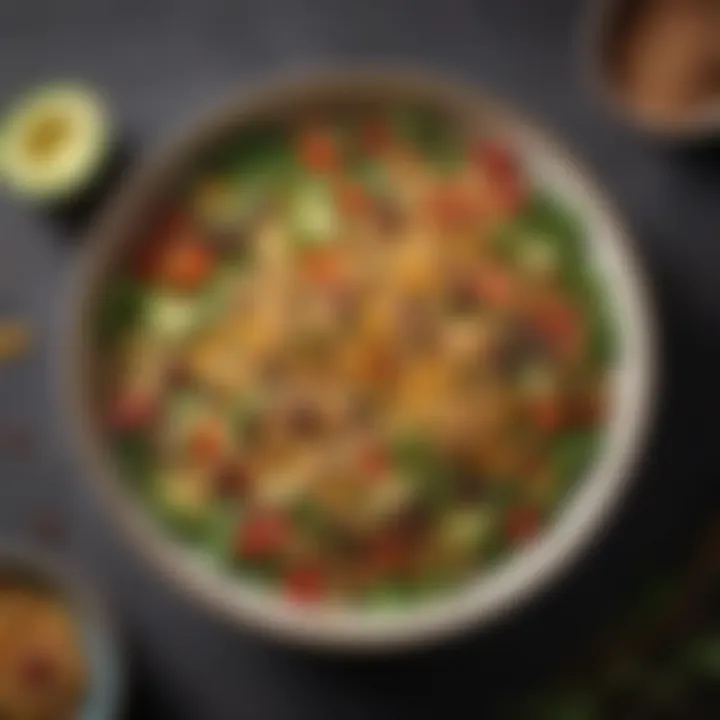Healthy Vegetarian Recipes to Aid Weight Loss


Intro
Embarking on a weight loss journey often leads individuals to explore various dietary practices. One approach that has gained significant traction is vegetarianism. This choice is not merely about abstaining from meat; it’s about embracing a diverse array of plant-based foods that provide essential nutrients. A vegetarian diet can be rich in vitamins, minerals, and fiber, which are crucial for overall health and can contribute to weight loss.
This article aims to present a collection of healthy, easy vegetarian recipes specifically tailored for those focused on losing weight. These recipes are designed to be not only nutritious but also enjoyable to prepare and eat. We will delve into various meal categories to ensure that you have a well-rounded selection of dishes to choose from. The goal is to highlight how simple ingredients can yield flavor and satisfaction without compromising your weight loss objectives.
Each recipe will provide clarity about its nutritional benefits, key ingredients, and potential substitutions for common elements, making it easier for you to tailor meals to your preferences. Let's dive into an overview of what you can expect from these recipes, keeping in mind the balance between health and enjoyment.
Prelims to Vegetarianism and Weight Loss
Embarking on a vegetarian journey can bring numerous health benefits, particularly when paired with weight loss objectives. Vegetarianism often emphasizes whole, nutrient-dense foods, which aid in reducing caloric intake while enhancing nutrient absorption. By focusing on plant-based ingredients, individuals may find it easier to manage their weight while enjoying a diverse array of flavors and textures.
The Connection Between Diet and Weight Loss
Diet plays a crucial role in weight management. Research indicates that a diet rich in vegetables, fruits, and whole grains can significantly impact body weight. Studies have shown that individuals consuming plant-based diets tend to have lower body mass indexes (BMIs) than those who eat meat regularly. This is largely attributable to the high-fiber content in vegetarian foods, which promote satiety and reduce overall calorie consumption.
Choosing vegetarian meals can also support sustainable weight loss by lowering the risk of developing diet-related diseases. By incorporating legumes, nuts, and seeds as protein sources, individuals can maintain muscle mass even while losing fat. Additionally, vegetarian diets are often lower in saturated fats, which are associated with obesity and cardiovascular disease, thus fostering an overall healthier lifestyle.
Understanding Vegetarianism as a Lifestyle
Vegetarianism is not just a diet; it is a holistic lifestyle choice that encompasses ethics, health, and environment. The ethical perspective often drives individuals to choose a meat-free diet, as it promotes compassion towards animals. This aligns with many people’s desires to make conscious consumer choices that resonate with their values.
Health-wise, adopting a vegetarian lifestyle opens up a world of culinary exploration. It encourages the consumption of a wide variety of foods. Whole grains, legumes, fruits, and vegetables not only provide crucial vitamins and minerals but also invite greater creativity in meal preparation. When individuals shift to vegetarianism, they often rediscover their relationship with food, experimenting with ingredients and cooking methods they might not have considered before.
In summary, vegetarianism offers a practical approach to managing weight, while also fostering a healthier relationship with food. The integration of nutritious, plant-based options into daily meals can prove effective not only for weight loss but also for overall health improvement. With careful planning and preparation, anyone can enjoy the wide range of benefits that a vegetarian lifestyle has to offer.
Nutritional Aspects of a Vegetarian Diet
A vegetarian diet can be an effective approach for weight loss when it is well-balanced. This section discusses several key nutritional elements important for those following a vegetarian lifestyle. Understanding these aspects helps one make informed food choices and ensure that their nutritional needs are met while aiming to lose weight. Here, we explore essential nutrients, plant-based protein sources, and the significance of fiber in weight management.
Essential Nutrients for a Balanced Diet
A balanced vegetarian diet requires incorporating a variety of nutrients. It should include essential vitamins and minerals that the body needs to function well. Important nutrients to focus on are:
- Protein: Necessary for muscle repair and growth. While many think meat is the main protein source, many plant-based foods also offer substantial protein.
- Iron: Important for blood health and energy levels. Plant sources, such as lentils or spinach, can provide Iron, but pairing them with Vitamin C-rich foods can enhance absorption.
- Calcium: Vital for bone health. Dairy products, leafy greens, and fortified alternatives can ensure adequate intake.
- Omega-3 Fatty Acids: Important for heart health. Flaxseeds and walnuts are excellent sources for vegetarians.
- B Vitamins: These are crucial for energy metabolism. Foods like whole grains, nuts, and seeds can provide these vitamins effectively.
Ensuring these nutrients are included regularly helps in maintaining overall health, which is vital during weight loss.
Plant-Based Protein Sources
When following a vegetarian diet, protein intake requires attention. Numerous plant sources supply high-quality protein. Here are some notable options:
- Legumes: Beans, lentils, and peas are rich in protein and also provide fiber. They make a filling meal without excess calories.
- Quinoa: This grain is a complete protein, meaning it contains all nine essential amino acids, making it an ideal food for vegetarians.
- Soy Products: Tofu and tempeh are versatile sources of protein and can be used in a variety of dishes.
- Nuts and Seeds: Almonds, chia seeds, and hemp seeds offer protein along with healthy fats, helping meet both energy and nutrient needs.
Incorporating these sources into meals can effectively satisfy protein needs and promote muscle retention during weight loss.
Fiber's Role in Weight Loss
Fiber plays a crucial role in weight management by promoting satiety and aiding digestion. Foods high in fiber are generally low in calories, making them an excellent choice for weight loss. Key benefits of fiber include:
- Increased Satiety: High-fiber foods take longer to chew and digest, allowing the body to feel full longer and reducing overall calorie intake.
- Improved Digestion: Fiber aids in digestive health by preventing constipation and promoting regular bowel movement.
- Stabilized Blood Sugar Levels: Consuming fiber-rich foods can help maintain stable blood sugar levels, which may reduce cravings and prevent overeating.
To maximize fiber intake, choose whole fruits, vegetables, whole grains, and legumes. Each of these foods helps ensure you get the fiber necessary for effective weight loss while maintaining overall health.
A well-planned vegetarian diet can provide all essential nutrients, ensuring you meet your health goals while enjoying diverse and flavorful meals.
Easy Meal Preparation Techniques
Meal preparation is a crucial component in a successful vegetarian diet, particularly for those aiming for weight loss. This section focuses on the techniques that streamline cooking processes and ensure consistent quality of meals. Proper meal preparation not only saves time but also minimizes the chances of unhealthy eating. Planning ahead allows individuals to make informed choices and control portion sizes effectively.
The Importance of Meal Prepping
Meal prepping involves preparing meals in advance, which can be particularly beneficial for anyone leading a busy lifestyle. When individuals have ready-to-eat meals, they are less likely to resort to unhealthy options. This practice cuts down on the time needed to decide what to cook during hectic days. Moreover, preparing meals in bulk can lead to healthier eating habits.
- Control Over Ingredients: By preparing meals, one can choose nutritious, whole ingredients, and avoid processed items.
- Portion Management: Meal prepping allows a more accurate control of portion sizes.
- Cost Efficiency: Shopping in bulk can reduce food costs, making it a budget-friendly way to eat healthy.


Batch Cooking for Busy Lifestyles
Batch cooking is an effective strategy for individuals who have limited time for cooking during the week. This method involves preparing large quantities of food at once and storing portions for future meals. It ensures that healthy options are available without daily cooking stress.
Some practical steps to apply batch cooking include:
- Choose Versatile Recipes: Opt for recipes that can be easily stored. Dishes like soups, stews, and grain bowls are excellent choices.
- Divide into Portions: After cooking, separate the meals into individual containers. This way, each meal can be grabbed quickly.
- Use Freezer Space: Freezing meals can keep them fresh for an extended duration. It is also helpful for making use of seasonal produce when it is abundant.
Utilizing Leftovers Wisely
Utilizing leftovers is another essential technique in meal preparation. Leftover food can be transformed into new meals, reducing waste and saving time. Being creative with yesterday's meals can add variety to one's diet without the extra time investment.
- Reinvent Leftovers: Leftover roasted vegetables can be added to a salad or blended into a soup.
- Store Properly: Make sure food is stored in airtight containers to maintain freshness. Labeling containers with dates can help track whether the food is still good to consume.
- Incorporate into New Dishes: Utilize remaining grains in stir-fries, or create wraps with leftover proteins and vegetables.
By applying these meal preparation techniques, individuals can significantly enhance their ability to sticking to their dietary goals.
Being strategy-driven in culinary activities not only aids in weight loss but also enriches the enjoyment of food while maintaining a vegetarian lifestyle.
Breakfast Recipes for Weight Loss
Breakfast is widely recognized as a critical meal for initiating the day. For those pursuing weight loss, breakfast becomes even more significant. This is because a well-balanced morning meal sets the stage for healthy choices throughout the day. Choosing nutrient-rich breakfasts can help in curbing unnecessary hunger and stabilizing energy levels. Incorporating a variety of flavors and textures can make it enjoyable, encouraging adherence to a healthy eating pattern.
The following sections will introduce simple yet effective breakfast recipes that prioritize taste, nutrition, and weight-loss goals. By focusing on whole foods and plant-based ingredients, you can create meals that are both satisfying and beneficial to your overall health.
Overnight Oats Variations
Overnight oats offer a convenient solution for busy mornings. This dish showcases versatility and is easy to customize based on personal preferences. To prepare, simply combine oats with a liquid such as almond milk or soy milk. You can mix in fruits, nuts, seeds, and sweeteners according to your taste. Common variations include:
- Berry Blast: Mix rolled oats, almond milk, fresh berries, and a touch of honey.
- Nutty Delight: Combine oats, oat milk, chopped walnuts, and banana slices.
- Choco-Coconut: Use chocolate almond milk, oats, shredded coconut, and a sprinkle of cocoa powder.
These combinations not only add flavors but provide essential nutrients, fiber, and protein, vital for weight loss.
Vegetable Omelettes without Eggs
Creating an egg-free vegetable omelette is a wonderful option for breakfast. Using chickpea flour as a base, you can whip up a nutritious and fulfilling dish. To make it, blend chickpea flour with water to form a batter. Then add diced vegetables like bell peppers, spinach, or onions. Cook this mixture in a non-stick skillet until golden brown. Add seasonings like salt, pepper, or turmeric for enhanced flavor.
This dish is packed with protein from chickpea flour and offers the benefit of varied veggies. It can even be made ahead and warmed up, making it suitable for a quick breakfast.
Smoothie Bowls for Nutrition and Satiety
Smoothie bowls offer an appealing and visually enticing way to enjoy breakfast while still focusing on health. The base can be crafted from blended fruits such as bananas, spinach, or berries with yogurt or plant-based milk. You can customize toppings according to preference, including:
- Granola for crunch.
- Chia seeds for added fiber.
- Sliced fruits for color and taste.
Smoothie bowls are filled with vitamins and antioxidants, important for a well-rounded breakfast while being satisfying. The active combination of nutrients can be instrumental in keeping hunger at bay.
In summary, breakfast is an essential part of a weight loss journey. Including these healthy and easy vegetarian recipes not only promotes better eating habits but also ensures you start the day on the right foot.
Lunch Options That Satisfy
Lunch is a pivotal meal in maintaining energy levels throughout the day. Choosing the right options can positively affect productivity and focus. This section emphasizes tasty and healthy vegetarian lunches that can aid in weight loss. By selecting meals rich in nutrition and flavor, individuals can avoid the pitfalls of processed foods and high-calorie alternatives. The focus is on meals that are not only easy to prepare but also satisfying, ensuring that hunger does not lead to unhealthy snacking later in the day.
Quinoa Salad with Seasonal Vegetables
Quinoa salad holds a prominent place in vegetarian diets due to its protein content and versatility. This dish combines cooked quinoa with a variety of seasonal vegetables such as bell peppers, cucumbers, and cherry tomatoes. Fresh herbs like cilantro or parsley can enhance flavor significantly. A simple dressing made from olive oil and lemon juice conveys a zesty freshness that complements the salad perfectly. The fiber from the vegetables and quinoa helps in keeping you full, which is crucial for weight management. Moreover, this salad can be made in larger quantities, making it an ideal option for meal prep.
Chickpea Wraps with Creamy Dressing
Chickpea wraps are both nutritious and filling. Chickpeas are an excellent source of protein and fiber, offering sustained energy throughout the afternoon. Wraps can be constructed using large lettuce leaves or whole-grain tortillas. Fill them with mashed chickpeas, diced vegetables, and a creamy dressing made from tahini or yogurt mixed with garlic and lemon. This combination provides a hearty meal that is also easy to digest. Not only are these wraps convenient for on-the-go lunches, but they also offer flexibility in ingredients to suit personal taste preferences, adding to their appeal.
Minestrone Soup: A Heartfelt Choice
Minestrone soup is deeply satisfying and offers warmth and comfort. It is made with a base of vegetable broth and combined with vegetables, beans, and sometimes whole grains like pasta or barley. Carrots, zucchini, and spinach are often included to boost the nutritional value. Seasoned with Italian herbs, this soup is flavorful without being overpowering. It provides a low-calorie, high-fiber meal that can be consumed in generous portions. Furthermore, minestrone soup is easy to prepare in batches, making it a practical option for weekday lunches.
"By focusing on whole food ingredients and minimizing processed options, one can enrich their diet significantly while still enjoying satisfying meals."
Dinner Recipes to End the Day


Dinner is an essential meal that can set the tone for a restful night or influence next day’s hunger. As the last meal of the day, it should be nourishing and satisfying. This section explores easy and healthy vegetarian dinner recipes that aid in weight loss while maintaining flavor. Balancing nutrients is key, as it allows you to feel satisfied without the heaviness that often accompanies traditional dinner fare.
Choosing wholesome ingredients also matters. Plant-based proteins, fibers, and vitamins from vegetables contribute to fullness and overall health. Emphasizing diversity in flavors and textures can make dinner more enjoyable, which aids in sticking to weight loss goals.
Stir-Fried Tofu and Vegetables
Stir-frying is quick and preserves the nutrients of vegetables. For this recipe, choose firm tofu as it holds its shape well when cooked. Start by pressing the tofu to remove extra moisture. Cut it into cubes, and stir-fry it in a non-stick pan until golden brown. The combination of firm tofu and colorful vegetables adds a satisfying texture and flavor profile.
Ingredients:
- Firm tofu
- Bell peppers
- Broccoli
- Carrots
- Soy sauce
- Ginger and garlic for seasoning
Cook vegetables until tender-crisp. Mix in tofu and drizzle with soy sauce. This meal can be served over quinoa or brown rice, making it filling without being heavy.
Lentil Stews Packed with Flavor
Lentils are a fantastic source of protein and fiber. They cook quickly and absorb flavors well. This recipe highlights the versatility of lentils in stew form, making it a comforting and nutritious dish for dinner. Begin by sautéing onions, garlic, and any preferred spices. Add chopped vegetables like carrots and celery, along with lentils and vegetable broth.
Key Points:
- Season with bay leaves, thyme, or cumin.
- Allow it to simmer until lentils are tender.
- Optional: finish with a splash of lemon juice for brightness.
Lentil stew can be made in batch and stored for future meals, which is efficient for busy days.
Stuffed Bell Peppers with Quinoa and Beans
Stuffed bell peppers can be a visually appealing and nutritious option. Cook quinoa and mix it with black beans, corn, and spices. Hollow out the bell peppers and fill them with the quinoa mixture. Bake in the oven for about 30 minutes until the peppers are tender.
This dish not only provides a complete meal with protein, but is also high in vitamins A and C from bell peppers. You can customize this recipe easily; add chopped tomatoes, cheese, or avocado if desired, creating a fulfilling dinner option.
Incorporating plant-based meals into your dinner routine enhances your diet while aiding in weight management.
These simple, yet flavorful vegetarian dinner recipes offer nourishment and satisfaction for those looking to lose weight. By embracing easy preparations and wholesome ingredients, achieving your dietary goals can become more manageable. The key is to combine taste with nutrition effectively.
Snacks That Are Nourishing and Filling
Snacking often gets a bad reputation when discussing diets, mainly because many snacks are processed and lack nutritional value. However, snacks can be an important part of a healthy eating plan. For those aiming for weight loss, choosing nourishing and filling snacks can prevent overeating during main meals while providing essential nutrients. In this section, we will explore three delightful snack options that not only satisfy hunger but also contribute positively to a vegetarian diet.
Roasted Chickpeas with Spices
Roasting chickpeas is an excellent way to create a crunchy and satisfying snack. Chickpeas are rich in protein and fiber, making them an ideal food for weight loss. The high fiber content promotes a feeling of fullness, helping to curb hunger pangs between meals.
To make roasted chickpeas, you need to start with canned or cooked chickpeas. Drain and rinse them thoroughly. Pat them dry with a towel. Next, toss the chickpeas with olive oil and your choice of spices. Common options include cumin, paprika, garlic powder, and salt. Spread them on a baking sheet and roast in the oven at 400°F (about 200°C) for around 20 to 30 minutes, or until golden and crispy.
This snack is not only easy to prepare but is also versatile. You can experiment with different spice blends to suit your taste. They also make a great topping for salads or soups.
Homemade Vegetable Chips
Vegetable chips are another great snacking option that can easily be made at home. They provide an alternative to traditional potato chips, which often have high amounts of unhealthy fats and calories. By making your own vegetable chips, you gain control over the ingredients.
To prepare, slice vegetables such as carrots, zucchini, and beets thinly. Toss them in a little olive oil and season with salt or herbs. Bake them in the oven at a low temperature (around 350°F or 175°C) until they become crisp. This process may take some time, so keep an eye on them to avoid burning.
Homemade vegetable chips can satisfy that crunchy craving without the added guilt. They are also rich in vitamins and minerals, as they retain much of their nutritional content during cooking.
Nut Butter with Fresh Fruits
Combining nut butter with fresh fruits creates a satisfying and nutrient-dense snack. Nut butter is high in healthy fats and protein, while fruits offer natural sweetness and fiber. This balance helps maintain energy levels without the crash that comes from sugary snacks.
Common choices include almond or peanut butter spread on apple or banana slices. Not only is this snack easy to prepare, but it is also filling and tasty. You can add a sprinkle of cinnamon or a drizzle of honey for extra flavor.
This snack option is especially good after a workout as it helps in recover.
Emphasizing Whole Foods
Focusing on whole foods is essential for anyone looking to lose weight while ensuring optimal nutrition. Whole foods are foods that are minimally processed and free from artificial ingredients. They offer a true representation of nutrition and flavor, which is crucial in maintaining a vegetarian diet that supports weight management. By choosing whole foods, you prioritize nutrient-dense options, allowing for reduced caloric intake while maximizing nutritional benefits.
Choosing Seasonal Produce


Choosing seasonal produce is beneficial for several reasons. Firstly, seasonal fruits and vegetables are often fresher and tastier. For example, tomatoes are at their peak in summer, while squash shines in fall. Eating with the seasons not only enhances flavor but also ensures you are consuming produce at its nutritional best. Additionally, seasonal produce typically costs less, making it an economical choice. You can reduce food waste by using ingredients that are abundant and at their prime.
- Benefits of Seasonal Produce:
- Better taste and freshness.
- Higher nutritional value.
- Cost-effective.
- Supports local farmers and the economy.
A simple way to incorporate seasonal produce into your diet is by planning meals around what’s currently available at your local farmers' market or grocery store. Keep an eye on what's in season in your area. Websites like Wikipedia can guide you on which produce is in bloom.
Incorporating Whole Grains
Whole grains should be a staple in your vegetarian diet. They provide essential nutrients like fiber, B vitamins, and antioxidants. Whole grains such as quinoa, brown rice, and barley are integral to maintaining a balanced meal. Unlike refined grains, whole grains retain their nutrient-rich bran and germ, which can help with digestion and keeping you fuller for longer.
- Whole Grain Options:
- Quinoa
- Brown Rice
- Whole Wheat Pasta
- Oats
Consider substituting white rice with quinoa in your salads or soups. Whole grains add texture and depth, enhancing your culinary experience. For recipes, the conversion from white to whole grain is often simple and requires no major adjustments other than perhaps a slightly longer cooking time.
Understanding Processed Foods
Understanding processed foods is critical for making healthier choices. Processed foods can range from minor modifications, like canned vegetables, to heavily processed items, such as flavored snacks. When trying to lose weight, it is wise to limit ultra-processed foods, which often contain high levels of sugar, salt, and unhealthy fats. They can contribute to weight gain and diminish overall health.
- Identifying Processed Foods:
- Ingredients with unfamiliar names or fillers.
- High in additives and preservatives.
- Low in natural nutrients.
Instead, focus on incorporating more whole foods into your meals. An awareness of labels can help you make better choices in the supermarket. Reducing processed foods can lead to improved well-being and better weight loss results.
Behavioral Aspects of Eating Well
Eating well goes beyond simply choosing the right foods. It encompasses behaviors and habits that influence how we approach food, which in turn can have a significant impact on our health and weight loss goals. Understanding these behavioral aspects is essential for maintaining a healthy vegetarian lifestyle. This section delves into mindful eating practices and portion control strategies, both of which are vital for achieving and sustaining weight loss.
Mindful Eating Practices
Mindful eating is about being fully present during your meals. It encourages individuals to pay attention to the tastes, textures, and aromas of their food. This practice helps in recognizing hunger cues and fosters a healthier relationship with food. Here are some key components of mindful eating:
- Slow Down: Eating slowly allows time to savor food and recognize when you are satisfied. It gives your brain enough time to register fullness.
- Limit Distractions: Eating while watching television or browsing on your phone can lead to overeating. Focus on your meal to truly enjoy and appreciate it.
- Engage Your Senses: Paying attention to the flavors, colors, and even the sounds of your food can enhance your eating experience and satisfaction.
Research shows that individuals who practice mindful eating tend to consume fewer calories and enjoy their meals more. This could be a helpful strategy for those pursuing weight loss.
Portion Control Strategies
Portion control is crucial in any weight loss plan. It involves managing the amount of food you eat to avoid excess calorie intake. Understanding appropriate portion sizes is essential, especially in a vegetarian diet where high-starch foods can lead to overeating. Here are some strategies to consider:
- Use Smaller Plates: Serving meals on smaller plates can create the illusion of a fuller plate, helping regulate portion sizes without feeling deprived.
- Plan Meals Ahead: Preparing meals in advance can provide structure and help you manage portions effectively. This ensures you are eating the right amounts and reduces the temptation to snack mindlessly.
- Listen to Your Body: Learn to recognize signs of hunger and fullness. Stop eating when you are satisfied, not stuffed.
"Practicing good portion control and mindful eating are fundamental strategies in not just weight loss, but in promoting overall wellness within a vegetarian lifestyle."
The End: Embracing a Healthy Vegetarian Lifestyle
Adopting a vegetarian lifestyle can offer numerous advantages, especially when it comes to weight loss and overall health. The core idea behind embracing a vegetarian diet is not merely about removing meat from meals; instead, it involves a deeper commitment to understanding food choices and their impact on health.
Prioritizing plant-based ingredients can lead to a rich and varied diet filled with vitamins, minerals, and antioxidants. This shift can influence energy levels positively and improve overall well-being. Moreover, the delicious flavors found in vegetables, grains, legumes, and fruits can make meals enjoyable without relying on meat. There is a growing recognition that what one consumes significantly influences body composition, thus making vegetarianism an appealing option for many.
Long-Term Benefits of Vegetarianism
When one chooses a vegetarian path, there are a number of long-term benefits that are hard to ignore. Firstly, many studies have shown that a well-rounded vegetarian diet can lead to a marked decrease in chronic diseases such as heart disease, diabetes, and certain cancers. This is largely due to the high levels of fiber and essential nutrients found in plant-based foods, which enhance cardiovascular health.
Additionally, vegetarian diets often result in healthier weight management. Many individuals choose vegetarianism as a strategy for weight loss and find it effective because plant-based foods generally have lower calorie density. Incorporating more vegetables and grains can lead to a feeling of fullness, which helps in controlling portion sizes and overall food intake.
Some noteworthy benefits of a vegetarian lifestyle include:
- Improved heart health
- Better weight management
- Enhanced digestion due to higher fiber intake
- Increased longevity based on dietary patterns
Sustaining Weight Loss Through Healthy Eating
To maintain weight loss in the long run, a focus on healthy eating habits is essential. People who shift to a vegetarian diet often report that their relationship with food improves. Mindful eating, which involves paying attention to hunger and satiety cues, becomes easier with a clean and vibrant vegetarian diet.
Consistency in healthy eating also plays a critical role. Here are some tips for sustaining weight loss:
- Plan meals ahead: Having a meal plan helps in making informed choices.
- Incorporate variety: Rotating different plant-based foods can prevent monotony.
- Stay hydrated: Sometimes thirst can be confused with hunger; ensure adequate water intake.
- Focus on whole foods: Minimize processed items and prioritize fresh ingredients.
Ultimately, the goal of embracing vegetarianism is not only about losing weight. It’s about leading a lifestyle that fuels the body and mind. A thoughtful approach to eating that prioritizes nutrition and satisfaction is key to long-term success.















